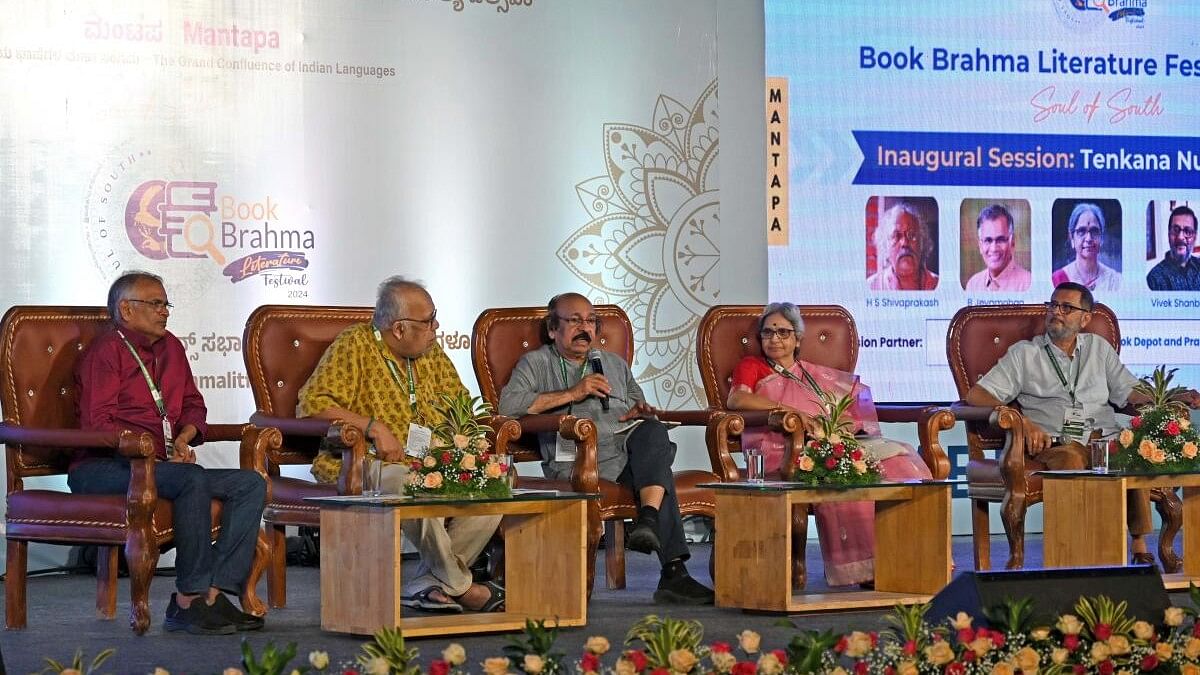
(L-R) B Jeyamohan, H S Shivaprakash, K Satchidanandan, Volga and Vivek Shanbhag, talks at the inaugural session 'Tenkana Nudi Kaudi' on the first day of Book Brahma Literature Festival 2024, at St Joseph Auditorium in Bengaluru on Friday.
Credit: DH Photo/Pushkar V
Bengaluru: Could AI change the literary landscape and could it produce something like the classics-- this was one of the many sessions at the three-day Book Brahma Literature festival, in the city, that started on Friday.
There were varying views-- from sceptical to anxious -- about AI’s threat to the future of writers and readers alike. While the panelists agreed that AI is certainly useful in data analytics, and that it should be regulated by humans, there was disagreement on AI’s potential to replace humans in the creative world.
Writer Deepa Ganesh, one of the panelists, in her opening remark, said the issue of generative AI is serious. She noted that the discussion around AI has changed from the threat of AI, the implementation of AI in health, democracy, finance to name a few. She quoted Yuval Noah Harari, “for the first time we don't know what the future looks like in 20 years”. She supported Harari’s view that humans could be transferring authority to something they haven't yet understood. While acknowledging that previous advances in technology also had the same panic, she added that the atom bomb and the printing press doesn't have the threat to snatch authority from human beings.
Visitors at the first day of Book Brahma Literature Festival 2024, at St Joseph Auditorium in Bengaluru.
Credit: DH Photo/Pushkar V
"If AI could create music and tell stories the same way humans can then it would be very unsettling” she said. She also quoted renowned intellectual Chomsky, who said "AI has seemingly human-like language" and Harari’s warning that AI can be a "catastrophe". There has to be a regulatory body to monitor AI because it has entered creative fields. First AI written novel called "Death of the Author" used 95 percent AI and five percent human input in 2023 in Canada. She warned that AI, in a way, represents the banality of evil because it has no insights or thoughts.
Rajendra Channi, a writer, was asked whether AI could change the face of literature. He said “Science and tech have always had a big impact on society. It can divide society and change the political landscape but at the same time turn age-old concepts upside down.” He added that the reason behind the paradigm shift due to AI is due to marketing by international capitalism and that AI has entered our lives without our knowledge. He was sceptical in his view on AI adding that it hasn't yet reached human intelligence, it cannot break the existing pattern and can churn out work that already exists and it propagates biases already existing within society.
People take photos with poet, short story writer, playwright, Jayant Kaikini on first day of Book Brahma Literature Festival 2024.
Credit: DH Photo/Pushkar V
About whether AI could recreate the relationship between the poet, emotion and language. Kannada folklorist and a fiction writer Krishnamurthy Hanur, said that If you read Kannada literature you'll see how strong the relationship between the poet and his surroundings are. AI would not be able to recreate that. After inserting an excerpt from Kuvempu’s 'Malegalli Madhumagalu' into AI to turn into a play, the output was not up to the mark. It didn’t have the human touch that only Kuvempu could give. We also asked AI to interpret Kumaravyasa and Akkamahadevi and it wasn’t very accurate. He noted that AI was fine for experts in the field but a student could be led astray by it.
Poornima Malagimani, another writer, said in lighter vein, when asked whether AI can generate classics that half the audience had left the auditorium after we started talking about AI. "I am not so sure people would read an AI novel. She doubted the ability for AI to create new sentences and words like humans could. “Can AI generate a line like ‘melancholy is the happiness of being sad’ found in Victor Hugo’s Les Miserables?” she wondered. She also wondered if, “AI could ever write about silent conversations between people? For example the conversation between a pedestrian hailing an auto and the auto driver, where information is shared through expressions and body language?”